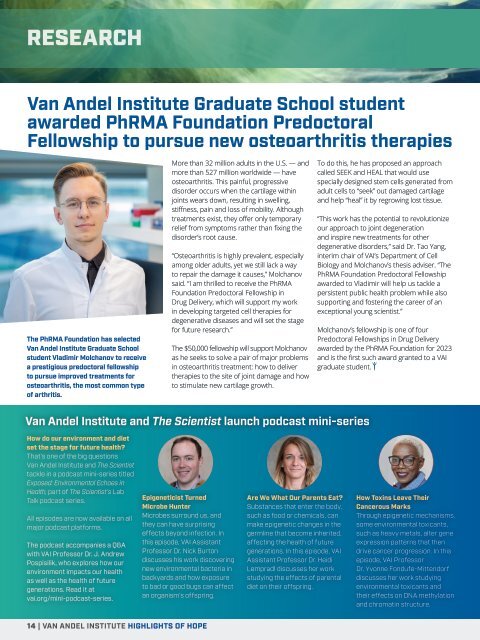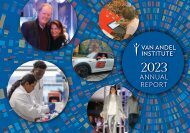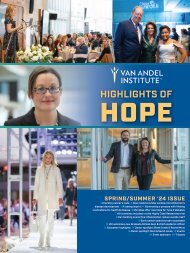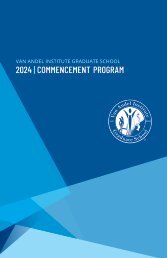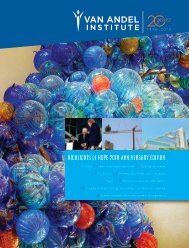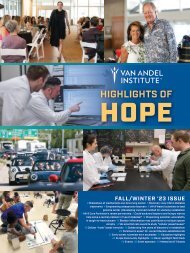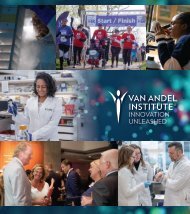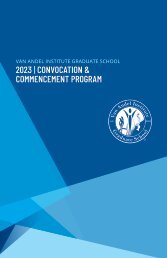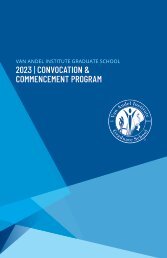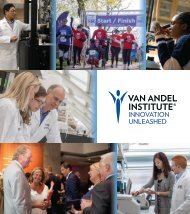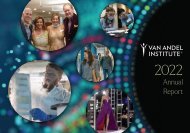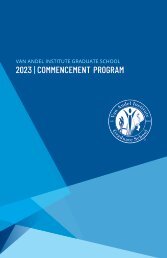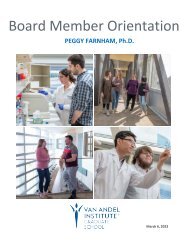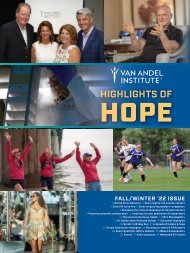Highlights of Hope Spring/Summer 23
This is the 2023 Spring/Summer edition of Van Andel Institute's Highlights of Hope donor publication.
This is the 2023 Spring/Summer edition of Van Andel Institute's Highlights of Hope donor publication.
You also want an ePaper? Increase the reach of your titles
YUMPU automatically turns print PDFs into web optimized ePapers that Google loves.
RESEARCH<br />
Van Andel Institute Graduate School student<br />
awarded PhRMA Foundation Predoctoral<br />
Fellowship to pursue new osteoarthritis therapies<br />
The PhRMA Foundation has selected<br />
Van Andel Institute Graduate School<br />
student Vladimir Molchanov to receive<br />
a prestigious predoctoral fellowship<br />
to pursue improved treatments for<br />
osteoarthritis, the most common type<br />
<strong>of</strong> arthritis.<br />
More than 32 million adults in the U.S. — and<br />
more than 527 million worldwide — have<br />
osteoarthritis. This painful, progressive<br />
disorder occurs when the cartilage within<br />
joints wears down, resulting in swelling,<br />
stiffness, pain and loss <strong>of</strong> mobility. Although<br />
treatments exist, they <strong>of</strong>fer only temporary<br />
relief from symptoms rather than fixing the<br />
disorder’s root cause.<br />
“Osteoarthritis is highly prevalent, especially<br />
among older adults, yet we still lack a way<br />
to repair the damage it causes,” Molchanov<br />
said. “I am thrilled to receive the PhRMA<br />
Foundation Predoctoral Fellowship in<br />
Drug Delivery, which will support my work<br />
in developing targeted cell therapies for<br />
degenerative diseases and will set the stage<br />
for future research.”<br />
The $50,000 fellowship will support Molchanov<br />
as he seeks to solve a pair <strong>of</strong> major problems<br />
in osteoarthritis treatment: how to deliver<br />
therapies to the site <strong>of</strong> joint damage and how<br />
to stimulate new cartilage growth.<br />
To do this, he has proposed an approach<br />
called SEEK and HEAL that would use<br />
specially designed stem cells generated from<br />
adult cells to “seek” out damaged cartilage<br />
and help “heal” it by regrowing lost tissue.<br />
“This work has the potential to revolutionize<br />
our approach to joint degeneration<br />
and inspire new treatments for other<br />
degenerative disorders,” said Dr. Tao Yang,<br />
interim chair <strong>of</strong> VAI’s Department <strong>of</strong> Cell<br />
Biology and Molchanov’s thesis adviser. “The<br />
PhRMA Foundation Predoctoral Fellowship<br />
awarded to Vladimir will help us tackle a<br />
persistent public health problem while also<br />
supporting and fostering the career <strong>of</strong> an<br />
exceptional young scientist.”<br />
Molchanov’s fellowship is one <strong>of</strong> four<br />
Predoctoral Fellowships in Drug Delivery<br />
awarded by the PhRMA Foundation for 20<strong>23</strong><br />
and is the first such award granted to a VAI<br />
graduate student.<br />
Van Andel Institute and The Scientist launch podcast mini-series<br />
How do our environment and diet<br />
set the stage for future health?<br />
That’s one <strong>of</strong> the big questions<br />
Van Andel Institute and The Scientist<br />
tackle in a podcast mini-series titled<br />
Exposed: Environmental Echoes in<br />
Health, part <strong>of</strong> The Scientist’s Lab<br />
Talk podcast series.<br />
All episodes are now available on all<br />
major podcast platforms.<br />
The podcast accompanies a Q&A<br />
with VAI Pr<strong>of</strong>essor Dr. J. Andrew<br />
Pospisilik, who explores how our<br />
environment impacts our health<br />
as well as the health <strong>of</strong> future<br />
generations. Read it at<br />
vai.org/mini-podcast-series.<br />
Epigeneticist Turned<br />
Microbe Hunter<br />
Microbes surround us, and<br />
they can have surprising<br />
effects beyond infection. In<br />
this episode, VAI Assistant<br />
Pr<strong>of</strong>essor Dr. Nick Burton<br />
discusses his work discovering<br />
new environmental bacteria in<br />
backyards and how exposure<br />
to bad or good bugs can affect<br />
an organism’s <strong>of</strong>fspring.<br />
Are We What Our Parents Eat?<br />
Substances that enter the body,<br />
such as food or chemicals, can<br />
make epigenetic changes in the<br />
germline that become inherited,<br />
affecting the health <strong>of</strong> future<br />
generations. In this episode, VAI<br />
Assistant Pr<strong>of</strong>essor Dr. Heidi<br />
Lempradl discusses her work<br />
studying the effects <strong>of</strong> parental<br />
diet on their <strong>of</strong>fspring.<br />
How Toxins Leave Their<br />
Cancerous Marks<br />
Through epigenetic mechanisms,<br />
some environmental toxicants,<br />
such as heavy metals, alter gene<br />
expression patterns that then<br />
drive cancer progression. In this<br />
episode, VAI Pr<strong>of</strong>essor<br />
Dr. Yvonne Fondufe-Mittendorf<br />
discusses her work studying<br />
environmental toxicants and<br />
their effects on DNA methylation<br />
and chromatin structure.<br />
14 | VAN ANDEL INSTITUTE HIGHLIGHTS OF HOPE


